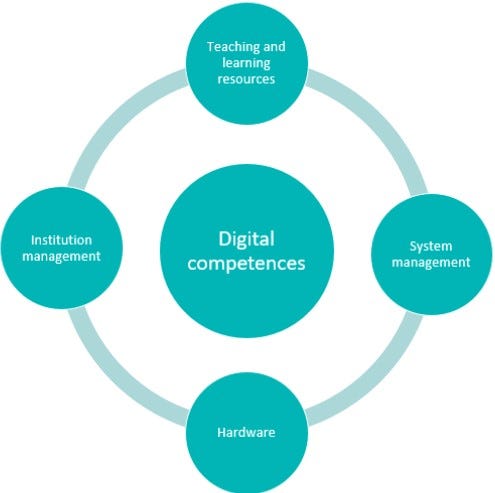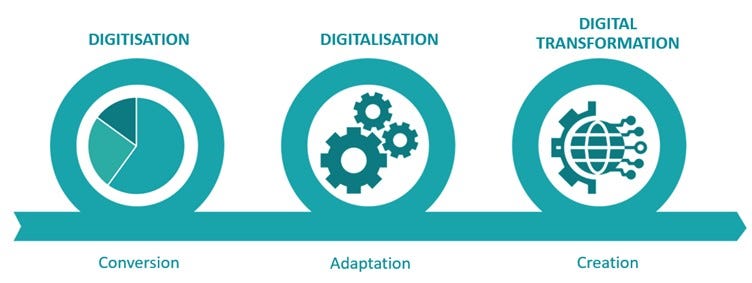Digital technology, including AI, can improve the effectiveness and quality of education by personalising education, be it teaching and learning or other education services, by making it more inclusive and possibly equitable, and by improving the cost-efficiency of the sector. A digital transformation of education also comes with risks that must be mitigated. The findings of the Digital Education Outlook 2023 suggest a few areas where countries should focus their efforts to catalyse their ongoing journey of digitising the education operations towards a proper digital transformation.
Digital education
Data and digital technologies such as Artificial Intelligence (AI) are powerful drivers of innovation in education, offering transformative opportunities for system and school management as well as for teaching and learning. However, they also create policy issues, such as equity concerns and interoperability, that countries need to mitigate.

Key messages
Several policy levers can help shape effective digital education ecosystems, inclusive of digital infrastructure, governance and human competences. These different models of provision and governance of digital education may, or may not, follow countries’ usual devolution of responsibilities. Beyond the public provision or procurement of publicly owned or private digital education tools and resources, policy levers include incentivising the development of teachers and students digital skills, fostering interoperability within the system, setting in place risk-management approaches to privacy and data protection, and creating institutions to facilitate the implementation of digital education policies.
Countries should balance different policy objectives to make the most intelligent use of AI in education. AI has the potential to improve the quality and equity of learning, free up teachers’ time to focus on their teaching and provide students with new routes to learning, provided that teachers and learners are given the right conditions to use such technologies. But its use also comes with new risks such as widening inequalities due to inequal access to technology, weaker usage by students and educators intimidated by technology, disparities in the capacity of educators and learners to make full use of their potential, challenges to assure the quality of digital resources, and data privacy.
Context
Countries now provide a minimal digital infrastructure
Most countries now maintain longitudinal student information systems and other digital management tools that support their educational processes: alert systems to enforce compulsory education, admission management, evaluations, etc. They also support the provision of digital teaching, learning resources and training.

Most countries are at the digitisation stage
Most countries have yet to fully leverage the capabilities offered by advanced digital tools. Very few AI-based educational resources are available in the classroom, and in almost all countries, AI text generators are the only AI tool commonly used by students, with or without the blessing of their teachers. Adaptive learning or assessment systems are absent from most OECD education systems.

Related publications
-
 24 April 2024
24 April 2024
Programmes and projects
-
Data and digital technologies are among the most powerful drivers of innovation in education, offering a broad range of opportunities for system and school management, as well as for teaching and learning. But they also create new policy issues as countries face challenges to reap the benefits of digitalisation in education while minimising its risks.Learn more
-
Artificial Intelligence (AI) and robotics are becoming increasingly sophisticated at replicating human skills. The evolution of these technologies could fundamentally transform work over coming decades and deeply affect education’s current role in providing skills and preparing learners for future work.Learn more
-
Understanding the nature of 21st Century childhood is crucial for an education that is increasingly expected to support students to thrive in both a digital and non-digital world, delivering academic learning while also building physical and emotional well-being. This has implications for the skills, capacity and resources required.Learn more
-
Preparing for the future means taking a careful look at how the world is changing. Reflecting on alternative futures helps anticipate and strategically plan for potential shocks and surprises.Learn more
-
The OECD Career Readiness project is designed to provide new advice to governments, schools, employers and other stakeholders on how to best prepare young people to compete in an ever-changing labour market.Learn more
-
The Centre for Educational Research and Innovation (CERI) provides and promotes international comparative research, innovation and key indicators, explores forward-looking and innovative approaches to education and learning, and facilitates bridges between educational research, innovation and policy development.Learn more
-
The Early Childhood Education and Care (ECEC) programme conducts analysis and develops new data to support countries in reviewing and improving their early childhood services and systems.Learn more
-
The Education Policy Outlook is an analytical observatory that monitors the evolution of policy priorities and policy developments from early childhood education to adult education, mainly among OECD education systems, to provide a comparative understanding of how policies are evolving, and how they can be best implemented or improved over time.Learn more
-
The OECD’s programme on education and skills policy support policymakers in their efforts to achieve high-quality lifelong learning, which in turn contributes to personal development, sustainable economic growth, and social cohesion.Learn more
-
OECD Future of Education and Skills 2030 aims to build a common understanding of the knowledge, skills, attitudes and values students need in the 21st century.Learn more
-
The Higher Education Policy Programme carries out analysis on a wide range of higher education systems and policiesLearn more
-
The Research, Development and Innovation (RDI) programme established by the PISA Governing Board in 2018 explores how different areas of the assessment programme (e.g. test design, scoring methodologies) can be improved.Learn more
-
Since 2013, the OECD has gathered evidence on how school resource policies work in different contexts. The focus is now on digital resources to enable countries to learn from each other in the digital transformation of their education.Learn more





